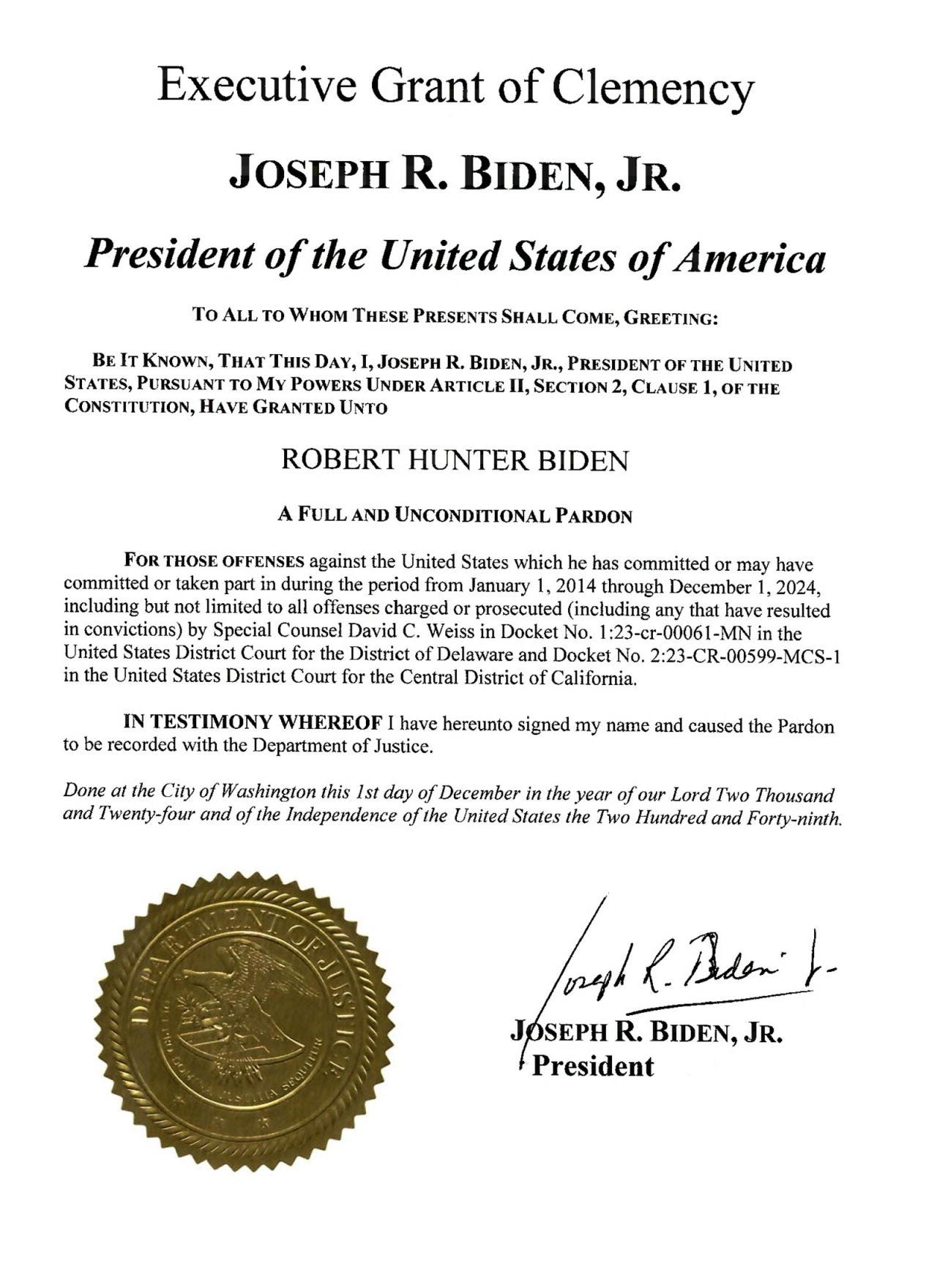Is Hunter Biden "above the law"? Did Joe Biden abuse the pardon power to benefit his son (and, indirectly, himself)?
In a colloquial sense, and politically speaking, yes and yes. But there is more to the story. Let’s dive in!
Hunter was here. Photo by Susan Q Yin on Unsplash
On December 1, 2024, President Biden pardoned his son Hunter after years of repeated denials that he would ever do such a thing. I mean, he gave his word as a Biden, so you know he meant it.
Young Hunter, age 54, was scheduled to be sentenced on December 12 for his previous conviction on federal gun charges. He also had a December 16 sentencing date in a separate case in which he had pled guilty to tax evasion. The pardon preempted any punishment in those cases.
Whatever the political fallout of this may be, President Biden acted within his authority in granting a pardon to his son. While it is well and often said that no one is above the law, it is important to remember that pardons and commutations are also part of the law, just as much as federal criminal statutes are.
In fact, the pardon power derives from the supreme law of the land, since it comes directly from the Constitution. And it is a power exercised solely and directly by the president. Congress has no role in granting pardons. Whether to grant a pardon is a decision for the president, and only the president, to make.
Was the Hunter Biden pardon wise, just, or fair? Probably not. But it was within the law.
A big blanket
One unusual aspect of the Hunter Biden pardon is its extraordinary breadth. Hunter was pardoned not only for the specific offenses for which he had previously been convicted (federal gun charges) and those to which he had pled guilty and was awaiting sentencing (tax evasion), but for any federal crime which he “has committed or may have committed or taken part in during the period from January 1, 2014 through December 1, 2024.”
So if Hunter has been secretly shooting bald eagles, trafficking in elephant ivory, or even engaging in illegal falconry filming, selling runny ketchup, or selling holeless Swiss cheese — he’s off the hook.
I’m not saying Hunter has done any of those things. But if he has, he just got away with it. More on point, the contents of Hunter Biden’s infamous laptop, points to him having potentially committed hundreds of federal crimes involving bribery, corruption, and failure to register as a foreign agent, along with numerous sex and drug related crimes.
None of which, to be clear, Hunter Biden was ever charged with.
But the pardon covers all federal crimes, known or unknown, charged or uncharged. Whatever he may have done, Hunter walks.
Unusual, but not entirely unprecedented
A presidential pardon of such broad scope is highly unusual. Most pardons are for specific offenses. And most individual pardons are granted to people who have already served at least a partial sentence for their crime and who have accepted responsibility for their past actions and shown genuine remorse and evidence of having reformed.
None of which applies to Hunter Biden’s pardon.
The most comparable “preemptive” pardon would be President Ford’s 1974 pardon of former President Nixon. The purpose of the Nixon pardon was to close the books on the “long national nightmare” of the Watergate scandal, for which Nixon potentially faced obstruction of justice and other charges.
President Ford believed a criminal trial of Nixon would only further divide the country and so granted him a full and absolute pardon for any criminal offenses Nixon may have committed. However:
The language of the Nixon pardon cited crimes he “has committed or may have committed” between Jan. 20, 1969, and Aug. 9, 1974 — language similar to Hunter Biden’s pardon.
As noted, that is not Watergate-specific, and the dates cover Nixon’s entire presidency.1
So, again, if President Nixon had been doing any secret eagle hunting, ivory smuggling, ketchup diluting, or other non-Watergate related federal crimes during his time in office, those were also covered by Ford’s pardon.
Another pardon of broad reach, though in a different sense, was President Carter’s blanket pardon of Vietnam War-era draft dodgers:
Jimmy Carter in 1976 pardoned most of those who dodged the Vietnam War draft between Aug. 4, 1964, and March 28, 1973. That covered a large group of people, but the pardon was only for violating Military Selective Service Act and related regulations.
Carter’s pardon applied to more than half a million people.2 It was, however, a pardon that only forgave violations of the Selective Service Act.
Both the Nixon pardon and the draft dodger pardon were highly controversial at the time and continue to be. The Hunter Biden pardon is also proving to be so.
Family matters
It is also not unprecedented for a president to pardon a wayward family member.
In 2001, President Clinton pardoned his half-brother Roger Clinton for 1985 cocaine-trafficking charges for which Roger had served time in federal prison.
And in 2021, once and future President Trump pardoned his son-in-law Jared Kushner’s father Charles Kushner for tax charges, retaliating against a witness, and making false statements to the Federal Election Commission. The senior Kushner had served 16 months out of a 2-year prison sentence on the charges.
Note that in both of these cases the pardoned relative had served at least a partial prison sentence for their crime. Again, this is not the case with Hunter.
Taking the Fifth off the table
Another interesting point about Hunter's blanket pardon for any and all federal crimes he may have committed in the past 11 years is that he can no longer "take the Fifth" if questioned or called to testify about those activities in an investigation into his various (alleged) criminal associates, such as (allegedly) Uncle Jim Biden and the Big Guy himself, dear old dad.
Since Hunter no longer has any legal jeopardy from incriminating himself by any testimony he may give, he has no basis to invoke the Fifth Amendment right against self-incrimination.
If, as many allege, Hunter was the “bagman” for a lengthy and lucrative family enterprise of selling influence and access to then-Vice President Biden then it is possible that his pardon puts the other participants at greater legal risk.
This suggests that closer to January 20, 2025, President Biden might issue a pardon of his brother James (Hunter’s business partner) and perhaps others.
Maybe even himself.
Can a president pardon himself? That’s a topic that deserves its own discussion. We’ll table that one for now.
Stay tuned!
If Joe Biden isn’t your dad, you can try your luck with these, available on Etsy.
‘The extraordinary breadth of Hunter Biden’s pardon’ https://www.msn.com/en-us/news/politics/ar-AA1v8I6w
Between August 1964 and March 1973, 209,517 American men violated the Military Selective Service Act were charged with failing to register with local draft boards or leaving the country to avoid military service, relocating to places like Canada or Sweden. Another 360,000 were never formally charged. Returning to the U.S. meant a likely prison sentence, so 50,000 of the 100,000 evaders who left the country stayed in Canada permanently.
Pardoning Vietnam War Draft Dodgers Was a No-Win Situation for Jimmy Carter





